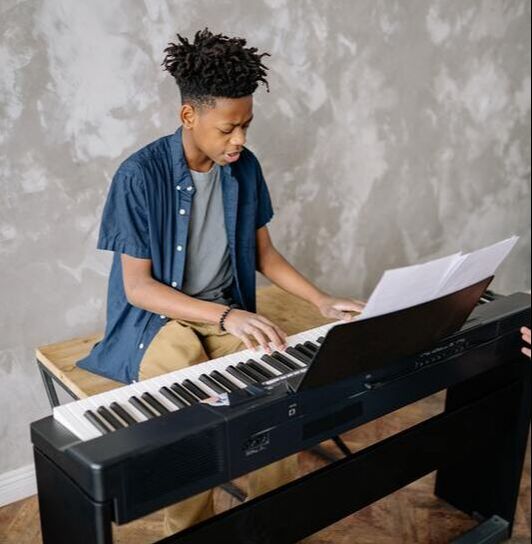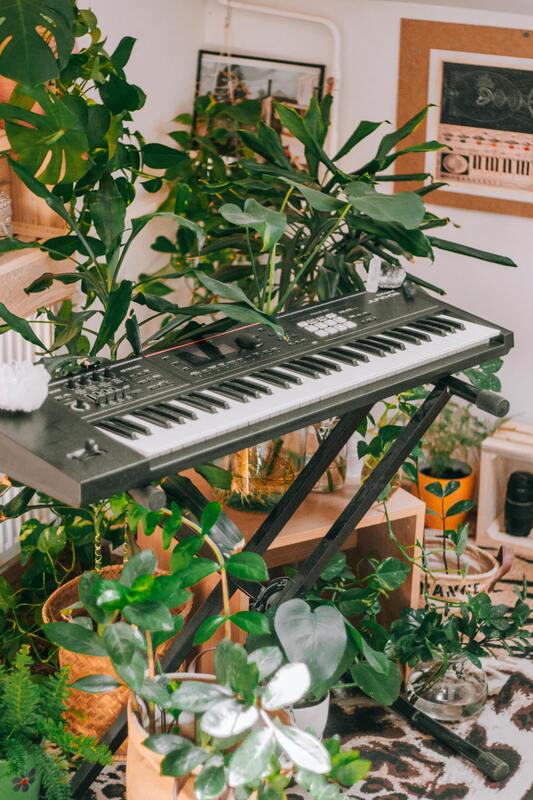|
In the video below, our instructor Casey Laughlin demonstrates how to develop your vibrato abilities on guitar. Learning how to play vibrato on guitar is a valuable skill that can greatly enhance a guitarist's expressiveness and musicality. Vibrato is a technique used to add depth and emotion to notes by subtly varying their pitch. By mastering vibrato, guitarists can imbue their playing with a more vocal quality, creating a more dynamic and engaging sound. This technique is particularly effective in blues, rock, and other genres where expressive playing is key. Furthermore, learning vibrato can help improve a guitarist's overall technique and control. Properly executing vibrato requires precise finger movements and a delicate touch, which can help develop finger strength and dexterity. Additionally, mastering vibrato encourages guitarists to pay closer attention to their tone and intonation, leading to a more polished and professional sound. Overall, learning how to play vibrato on guitar can significantly enhance a guitarist's playing style and musical expression.
0 Comments
Here is our instructor Casey Laughlin demonstrating how to play the major arpeggio on guitar. This lesson applies to both electric and acoustic guitar. Practicing the major arpeggio is highly beneficial for guitarists, offering a deep understanding of chord construction and enhancing both technical proficiency and musical expression. An arpeggio is the individual notes of a chord played in succession, and practicing the major arpeggio helps guitarists become familiar with the fundamental building blocks of music. By practicing the major arpeggio, guitarists develop a strong sense of harmony, as they learn to navigate the notes that make up a major chord. This knowledge is crucial for improvisation and composition, as it allows players to create melodies that complement the underlying chord progression. Moreover, practicing the major arpeggio improves a guitarist's finger dexterity and coordination. Playing arpeggios requires precise control over each finger, helping to develop strength and agility in both hands. This technical proficiency translates into smoother and more confident playing across all styles of music. Additionally, practicing arpeggios enhances a guitarist's ear training, as they learn to identify the individual notes of a chord by ear. This skill is invaluable for playing by ear and improvising, as guitarists can more easily identify which notes will harmonize with a given chord progression. Below is a video of our guitar instructor Casey Laughlin demonstrating how to play the major pentatonic scale. To learn how to play and use this scale in a step by step, fun, and achievable way book a trial lesson with Casey! Practicing the major pentatonic scale is highly beneficial for guitarists, offering a versatile and melodic foundation for improvisation and composition. This scale, derived from the major scale, consists of five notes per octave, creating a simple yet rich sound. By practicing the major pentatonic scale, guitarists develop a strong sense of melody, as the scale's structure encourages the creation of memorable and expressive musical phrases. This makes it an excellent choice for soloing and creating guitar licks that stand out in various musical contexts. Moreover, practicing the major pentatonic scale helps guitarists understand the harmonic relationships within a key. Since the major pentatonic scale shares the same notes as its relative major scale, players can easily see how the scale fits into a broader musical framework. This understanding is invaluable for guitarists looking to expand their musical vocabulary and create more sophisticated compositions. Additionally, the major pentatonic scale's simple and symmetrical pattern makes it easy to transpose to different keys, allowing guitarists to explore new tonalities and expand their musical horizons. Here is our guitar instructor, Casey Laughlin demoing how to play the chromatic scale. To learn this scale with a step by step teaching method book a trial lesson with him in person in our Chicago based guitar studio or online. Practicing chromatic scales is highly beneficial for guitarists, offering a comprehensive workout that enhances both technical proficiency and musical understanding. These scales, consisting of all twelve pitches within an octave, help develop finger dexterity and coordination, crucial for navigating the fretboard with ease. As guitarists move through the chromatic scale, they encounter various finger patterns and intervals, challenging their agility and precision. This practice is particularly valuable for beginners, as it lays a strong foundation for more complex scales and melodies. Moreover, practicing chromatic scales improves a guitarist's ear training and fretboard visualization skills. By playing each note in sequence, guitarists develop a deeper understanding of pitch relationships and intervals. This heightened awareness translates into improved improvisation and composition abilities, as players can more intuitively select notes that harmonize well. Additionally, regularly practicing chromatic scales enhances muscle memory, making it easier for guitarists to execute complex passages accurately and efficiently in their playing. Are you ready to embark on your musical journey and bring the enchanting sounds of the piano into your home? Purchasing the right keyboard is a crucial first step. Whether you're a beginner or a seasoned player, finding the perfect instrument can make all the difference in your musical experience. Here's a comprehensive guide to help you choose the ideal keyboard for your needs.
1. Consider Your Budget Before diving into the world of keyboard shopping, it's essential to determine your budget. Keyboards come in a wide range of prices, so setting a budget will help you narrow down your options and find a keyboard that fits both your needs and your wallet. 2. Determine Your Needs Are you a beginner looking for a keyboard to learn on? Or are you a seasoned player in need of a professional instrument? Consider your skill level and intended use for the keyboard. If you're just starting, a basic keyboard with essential features may suffice. However, if you're serious about playing, investing in a higher-end model with advanced features is recommended. 3. Choose the Right Number of Keys Keyboards come in various sizes, with 61, 76, and 88 keys being the most common. While a 61-key keyboard is compact and suitable for beginners, an 88-key keyboard is ideal for serious pianists, as it offers the full range of a traditional piano. If space and budget allow, opt for an 88-key keyboard to maximize your playing potential. 4. Look for Weighted Keys For a realistic piano playing experience, consider a keyboard with weighted keys. Weighted keys mimic the feel of an acoustic piano, providing the necessary resistance for proper finger strength and technique development. This feature is crucial for pianists who plan to transition to an acoustic piano in the future. 5. Consider the Brand When it comes to keyboard brands, several reputable names stand out. Casio, Yamaha, Roland, and Alesis are known for producing high-quality keyboards with a range of features to suit every player's needs. Each brand offers a variety of models to choose from, so be sure to compare specifications and read reviews to find the best keyboard for you. 6. Utilize Apps Like OfferUp, Craigslist, and Facebook Marketplace To find the best deals on keyboards, consider using apps like OfferUp, Craigslist and Facebook Marketplace. These apps connect buyers with sellers in their local area, making it easy to find a keyboard that meets your requirements at a reasonable price. Browse listings, communicate with sellers, and arrange a safe and convenient way to purchase your keyboard through the app. 7. Get the Right Accessories - Try to Find a keyboard that has a permanent stand unless you plan on moving the keyboard a lot. See photos below that depict the difference between these stands In addition to the keyboard itself, consider purchasing accessories such as a keyboard stand and seat. A sturdy stand will ensure your keyboard is at the correct height for comfortable playing, while a comfortable seat will provide proper support during long practice sessions. Conclusion Choosing the right keyboard is an important decision that can greatly impact your musical journey. By considering your budget, needs, and preferences, as well as utilizing resources like OfferUp to find the best deals, you can find the perfect keyboard to help you achieve your musical goals. Whether you're a beginner or a seasoned player, investing in a quality keyboard is a step towards a lifetime of musical enjoyment. Are you a tenor singer looking to improve your vocal range and clarity? Welcome to our tenor-specific vocal warm-up routine! This series of exercises, led by our talented instructor Kehsin Xu, is designed to help you warm up your voice effectively and efficiently, ensuring that you're ready to perform at your best. Are you a bass singer looking to improve your vocal range and clarity? Welcome to our bass-specific vocal warm-up routine! This series of exercises, led by our talented instructor Kehsin Xu, is designed to help you warm up your voice effectively and efficiently, ensuring that you're ready to perform at your best. Are you a baritone singer looking to improve your vocal range and clarity? Welcome to our baritone-specific vocal warm-up routine! This series of exercises, led by our talented instructor Kehsin Xu, is designed to help you warm up your voice effectively and efficiently, ensuring that you're ready to perform at your best.Title: "Vocal Warm-Up for Are you an alto singer looking to improve your vocal range and clarity? Welcome to our alto-specific vocal warm-up routine! This series of exercises, led by our talented instructor Kehsin Xu, is designed to help you warm up your voice effectively and efficiently, ensuring that you're ready to perform at your best. Are you a soprano singer looking to improve your vocal range and clarity? Welcome to our soprano-specific vocal warm-up routine! This series of exercises, led by our talented instructor Kehsin Xu, is designed to help you warm up your voice effectively and efficiently, ensuring that you're ready to perform at your best. |
Sam BarsiSam Barsi is a musician, instructor, and the founder of Pilsen Music. He lives on the southside of Chicago with his fiancé, Emily and their two cats. Archives
March 2024
Categories |



 RSS Feed
RSS Feed